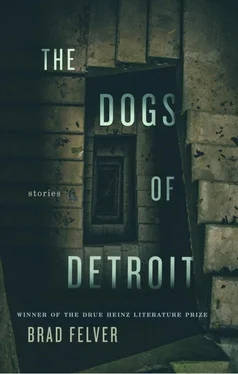“It’s beautiful,” she said again.
“This desk is made from bur oak and features through-mortises and a tripod—all of his desks do.” He eased out the lap drawer. “He does all the dovetails by hand, no jig. You can see the Shaker and Pennsylvania Dutch influences, of course, but he has carved out new territory. Remarkable work, lines as distinct as I’ve seen since Tom Moser.”
Ruth traced her fingers across the edges of the desktop. She could smell the workshop, the arousal taking shape in her. Sparks that had hidden themselves away, dormant for many years.
“We’re thrilled to have some of his pieces here,” the salesman said. He was young and very fashionable and seemed afraid of Ruth’s silence. “Ordinarily our New York and London stores get first crack, but they’ve done remarkably well here. All the young students, perhaps. People want smaller, cleaner desks now. Computers are smaller than ever. No more of those shelved, multilevel monstrosities of the eighties and nineties. That’s the trend, anyway.” He slid the lap drawer back in. “Quite the visionary.”
The pain from this encounter was real, and yet so was the excitement. Ruth was alternately sad and angry, though she couldn’t deny she felt more alive than she had in many years. She became convinced Gus’s aim was to torture her. He could have sold desks anywhere. Why Boston? Why so close to her parents’ old brownstone? Clearly, he wanted to force a confrontation between them where he would reveal to her… what? His children, his beautiful new wife? How he had survived and moved on? He would not say a word, but he would parade them in front of her. That was very like him, the quietest possible revenge.
But then other days she thought that perhaps Gus simply wanted to see her and didn’t know how. He would kiss her on the cheek, tell her how he had missed her, how differently his life had ended up without her. And then he would look down and say, “Could we just talk about her now?” And she would cry, and he would cry, and they would talk about her all night.
She found herself distracted during her lectures, and more than once she had to excuse herself into the hallway. For months this happened at regular—and then increasing—intervals. Harold Gutman noticed the change in her, but she told him it was just the stress of teaching.
Gus had burrowed his way back into that small nook of her brain where the trauma still lingered, quiet for many years but never truly dormant. His appearance had disturbed a system at rest, jolting it back into a slow but accelerating orbit that would slowly consume her. But Ruth surrendered to this freely, as if leaning into a strong wind, considering for the first time in many years that perhaps memory can exist without despair.
Harold Gutman didn’t understand why he needed a new desk. His old one worked perfectly well, and besides, he was used to it.
“This one is just better,” Ruth said.
“I liked all the drawers and nooks in my old one. Where will I put everything now?”
“You’ll get rid of things. That’s the point.”
He frowned, unconvinced. She sauntered over to the desk, leaned against its edge, and slid off her heels. She unbuttoned her blouse and leaned back, trying to appear seductive but feeling ridiculous.
“What are you doing?” Harold Gutman asked.
“I’m showing you how much better this desk is.”
“But we have a bed, a big comfortable bed. And I don’t think it can support us both. It seems to be missing one leg.”
She bought more desks, at first just to furnish guest bedrooms, then two more for the house Harold Gutman kept on the Cape, then more that she put directly into a storage bay. Eventually, the young furniture salesman asked what she’d been hoping he’d ask. “I’d be happy to arrange an introduction,” he said, “for such a generous fan of his work. He’s in town occasionally.”
“Oh, I don’t know,” Ruth said, suddenly feeling diffident as a teenager.
“I haven’t met him myself, but he’s supposed to be a modest, quiet sort of man. With all his success, he supposedly still lives in an old farmhouse in the middle of Iowa.”
She told him it wasn’t at all necessary, there was no need to go to such trouble. She just adored his desks was all. The salesman shrugged, unconcerned. Later that night, though, she dialed the number on his business card and told him that she had changed her mind. She would like to meet the artist the next time he came to Boston.
It was a Saturday in October when she arrived at the store to see him. She told Harold Gutman she had an appointment with a student, and he nodded, suspecting a lie was hidden somewhere. He had noticed her fussing in the mirror far longer than usual. They both knew they were clinging to the threads of whatever they had, like the last day of a vacation that is spent mostly on travel.
Wet leaves painted the sidewalks on Newbury Street. When she entered the store, Gus’s back was to her, but he was the same as ever. Hadn’t gained a single pound, though he’d gone fully gray. He wore carpenter’s jeans and a flannel shirt. As she drew nearer she realized that the pants weren’t just of a style; they were the exact pair he often wore years earlier. She recognized a stain above the left pocket.
How long had it been? She’d become horrible with dates. Twenty years? That sounded about right.
“Jesus,” he said when he turned around. It took him several moments before he could compose himself. Ruth felt absurd. She had hoped that he knew, that he had actively targeted Boston, but Gus seemed truly shocked.
They strolled down Newbury Street. Gus clasped his hands behind his back and took long, loping strides. He glanced over at her and smiled that calm smile she remembered. Strangers often took this for arrogance, but she knew it was just his quiet nature. Silence is something that should be protected , his father used to say.
“How’s the farm?” she asked.
“The same.” He stopped walking and looked up at the roofs of the buildings, tarnished copper and clay tile. He frowned. “That’s not true. I don’t know why I just said that. Queen Elizabeth died,” he said. “Came down in a bad storm a few years ago.”
“No!” she said.
He nodded. “More than a few years ago now, I guess. I built a kiln next to the barn and cured all the lumber I could, some thousands of board-feet.”
“And the desks?”
He nodded. “Bur oak is just about all I’ve worked with ever since.”
“I could tell you still use the handsaw for the dovetails. You always did hate those jigs.”
“You do something one certain way for long enough, and you become incapable of doing it any other way.” It was just like him to say something like that. But it made her feel more like a client than the mother of his dead daughter.
He stepped off the curb to allow a mother with a stroller to pass. Ruth watched the woman and child move away from them, then disappear around the corner.
“I suppose Queen Elizabeth is still in our bodies, isn’t she? Or her atoms anyway.”
Gus looked at her quizzically for a moment, and then he remembered. He nodded but said nothing.
They walked on in silence for several minutes, and then Ruth said, “I hated that doctor. But her story stuck with me. I guess that’s obvious, isn’t it? When I went back to my research after all those years, I tried to calculate it. How many atoms from the dead might migrate to the living. It became this strange obsession, not at all related to my dissertation. It took a long time, but I eventually worked out a reasonable prediction and asked a scientist on campus about it, and he pointed out that my math was generally good, but I’d overlooked one basic error of physics.”
Читать дальше












